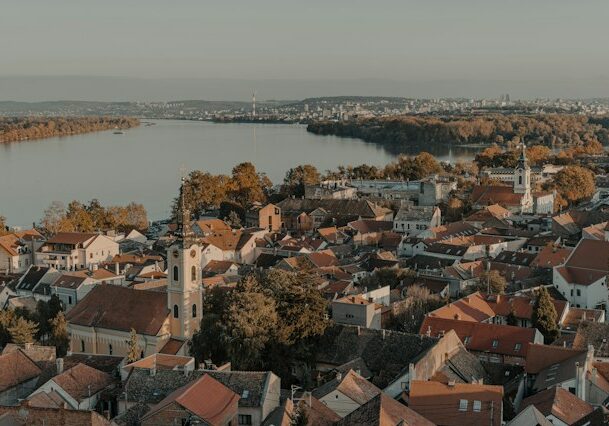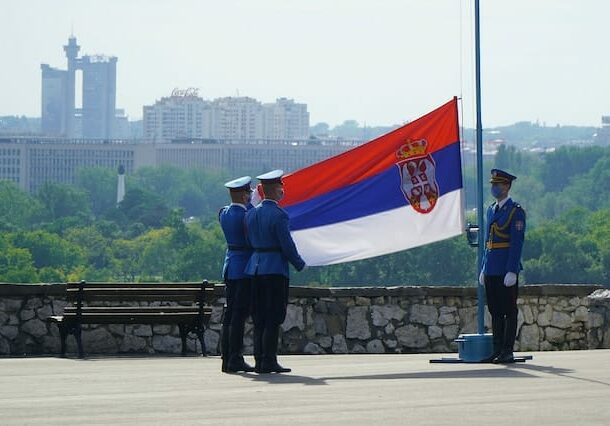
In this guide you’ll learn about:
- Why you should buy property in Serbia
- The Serbian property market
- Step by step process of buying property in Serbia
- The pros and cons of buying property in Serbia and more
Why buy property in Serbia?
Purchasing real estate in Serbia offers numerous advantages and opportunities for foreign citizens.
Six reasons to buy real estate in Serbia
- Residency by investment: Foreign non-residents who acquire property in Serbia can obtain Serbia Residency by Investment.
- No minimum investment threshold: Unlike most countries offering investment visas through real estate investment, Serbia’s program has no minimum investment threshold, meaning foreigners buy real estate in Serbia at any amount to fulfill the investment criteria for residency.
- Low house prices: Serbia has considerably lower average house prices than the United States and its European counterparts, with Americans and other foreign nationals able to buy properties such as residential buildings at affordable prices.
- High rental yields: Belgrade real estate located outside the city center offers higher rental yields than comparable areas in other capital cities, including London, Munich, and Sydney.
- Low living costs: Serbia has a low cost of living compared to the United States and other European countries.
- Potentially high capital appreciation: Serbia’s ongoing efforts towards EU membership could increase foreign investment and economic growth, potentially benefiting its real estate market.
Overview of the Serbian Property Market
Despite fluctuations observed in recent years, projections from Statista indicate a forecasted annual growth rate of 1.82 percent in Serbia’s real estate market from 2024 to 2028. Popular Serbian cities such as Belgrade and Niš drive Serbia’s real estate industry, attracting domestic and foreign investors with their dynamic economies, from business development to increasing tourism.
Types of Homes in Serbia

Apartments: In central areas of major cities like Belgrade, apartments in multi-story buildings are the most common form of housing for Serbians. They often feature central heating and air conditioning due to Serbia’s hot summers and cold winters, and it’s common to see balconies.
Detached houses: Further outside central areas of Sermajor cities are detached houses, characterized by traditional architectural styles influenced by Ottoman, Austro-Hungarian, and Balkan architectural traditions.
Kućas: “Kuća” is simply the word for house in Serbian but refers to traditional village homes in rural areas. They are often constructed from locally sourced wood, stone, and clay. They have a simple design with one or two stories, a courtyard, and sometimes outbuildings for agricultural purposes.
Can foreigners buy property in Serbia?
In adherence to factual reciprocity, Serbian law mandates that buying and owning property within its borders is subject to the same privileges being extended to Serbian citizens in the respective home countries of foreign buyers.
This implies that citizens of foreign countries like the United States, the United Kingdom, and Australia can invest in property in Serbia under the reciprocity principle, as Serbian citizens possess the legal right to acquire real estate in their respective countries. Additionally, legal reciprocity is fulfilled if Serbia has a bilateral agreement that grants foreigners the right to acquire real estate in the country.
Serbian property ownership limitations
While foreign nationals can legally buy real estate in Serbia, foreigners are prohibited from owning land close to military zones.
Step-by-Step Guide to Buying Property in Serbia as a Foreigner

- Search for a property: Browse popular Serbian real estate websites, including:
- Nekretnine
- 4zida
- Sasomange
- Hire a real estate agent: Serbian real estate agents can assist with the search for the best houses to live in or to earn rental income. Additionally, an investment migration consultant is beneficial for international buyers as they can direct foreign buyers to real estate agents who are able to facilitate purchases that qualify for the residence program.
- Check the property’s ownership and history: Serbia has a history of illegal constructions and properties not registered in the real estate cadastre. Employ a competent Serbian lawyer to examine the title deed and confirm property ownership and any legal issues.
- Sign a purchase agreement: After confirming the title deed, negotiate the purchase price and terms with guidance from the lawyer and have a purchase agreement drafted. The purchase and sale agreement should contain legal considerations, such as the timeline for the transaction to be completed.
- Make the down payment: Formalize the purchase by signing the purchase agreement. If you’re outside Serbia, you will need a Power of Attorney (POA) valid in Serbia for a representative to complete the purchase on your behalf, including paying a down payment of 10 to 20 percent of the sale price.
- Submit certificates to the notary public: Serbian law requires property transactions to be completed before a notary public. The property transaction and other legal considerations, including the sales contract, should be examined by your lawyer and sent to the notary. Pay the required registration fees to the notary to prepare for the property deed transfer.
- Pay transfer tax: Pay the real estate transfer tax of 2.5 percent. Transfer tax does not apply to new buildings; you will be liable to pay Value-Added Tax (VAT) instead.
- Pay for the property: Pay for the property per the terms agreed in the sale agreement.
- Register ownership: After notarization of the property transaction and transfer, the title deed must be entered into the Republic Geodetic Authority, the Serbian land registry.
Documents required to buy existing or new buildings in Serbia
While the exact documentation may vary based on property type and intended use, essential documents typically required from foreigners comprise:
- Valid passport
- Signed Power of Attorney if purchasing from abroad
Foreign documents in English or any other language must be accompanied by a sworn translation in Serbian and authenticated by a Serbian Embassy or Consulate in your home country.
Best Places to Buy a House in Serbia
Belgrade
Belgrade is a capital city often overlooked. While it’s relatively expensive by Serbian standards, buying property in Belgrade is much cheaper than in Washington DC, London, and EU capitals such as Madrid, Lisbon, and Munich. The city is full of affordable apartment buildings and offers a unique atmosphere, with historic buildings, excellent restaurants, and river clubs known locally as splavs.
Novi Sad
Nestled along the banks of the Danube River, Novi Sad is Serbia’s second-largest city and capital of the autonomous province of Vojvodina. The city is the country’s economic hub, yet it offers a lot culturally. It was voted the European Capital of Culture 2021. The city provides a serene environment and more affordable property prices than Belgrade.
Niš
Known as the Imperial City, Niš holds a distinguished place in history for its pivotal role in the Roman Empire and the Byzantine Empire. The city’s captivating and extensive history has transformed it into a prime tourist destination, regularly drawing enthusiasts of dark tourism to attractions such as the Skull Tower, thus making it an ideal Serbian city to buy property to earn rental income.
What taxes and fees must I pay when I purchase property in Serbia?
Here’s a basic breakdown of the primary Serbian property taxes and fees incurred during property acquisition in Serbia:
Tax | Fee | Type of Property |
Property transfer tax | 2.5 percent | All properties |
VAT | 10 percent | New residential buildings |
VAT | 20 percent | New commercial buildings |
Registration fee | €50 | All properties |
Notary fees | €300 to €500 | All properties |
Serbian property tax
Related costs for foreign ownership in Serbia include annual property tax, calculated based on the assessed market value of real estate. The property tax rate for residential property is 0.4 percent, and commercial property is subject to a 0.8 percent property tax rate.
Average House Prices in Serbia
City | Price Per M2 in the City Center | Price Per M2 Outside the City Center | Average Price for a 100 M2 Property |
Belgrade | €3,710 | €2,200 | €295,000 |
Novi Sad | €2,820 | €1,925 | €236,000 |
Niš | €1,930 | €1,335 | €163,000 |
Average house prices: Serbia vs the US
Country | Price Per M2 in the City Center | Price Per M2 Outside the City Center | Average Price for a 100 M2 Property |
Serbia | €2,660 | €1,700 | €218,000 |
United States | €7,855 | €5,330 | €659,000 |
Obtaining a Mortgage to Buy Real Estate in Serbia
Buying property with a mortgage in Serbia may be possible for foreigners holding a temporary residence permit or investments proving a credit history in Serbia. Banking regulations enforced by the National Bank of Serbia stipulate that non-resident foreigners do not qualify for mortgages or subsidized housing loans to acquire property in Serbia.
Serbian banks like Raiffeisen Bank Serbia and UniCredit Bank Serbia offer mortgages to Serbians and foreign residents with variable mortgage rates between two and six percent and mortgage terms of 20 years. The Serbian Ministry of Construction, Transport, and Infrastructure provides subsidized housing loans to citizens and long-term residents.
Pros and Cons of Buying Property in Serbia
Pros
1.Affordable property prices: Average property prices in Serbia are much lower than in the US and many other European countries.
2.Steady rental income: With a growing demand for rental properties, particularly in urban centers of cities like Belgrade and Niš, foreign investors can generate stable rental income.
3.Potential for capital appreciation: Serbia’s developing economy and increasing foreign investment could lead to property value appreciation in the near future.
4.Liberal foreign ownership laws: Serbia has liberalized its laws regarding foreigners owning real estate in the country, making it relatively easy for non-residents to purchase all types of property, from new buildings to agricultural land.
Cons
1.Legal complexity: Serbia’s legal system and property laws can be challenging for non-resident buyers with additional bureaucratic hurdles.
2.Risk of unauthorized constructions: Serbia has a history of unauthorized constructions and properties not registered in the Republic Geodetic Authority, presenting potential risks during property acquisition.
3.Ownership disputes: The lack of clarity in property restitution laws associated with historical nationalization has frequently resulted in ownership disputes.
4.Political and economic stability: Serbia’s political and economic situation may impact property values and investment opportunities.
Real Estate Due Diligence in Serbia

Essentially, the land use right functioned as a proxy for ownership, and holders of this right could transfer it to acquire full ownership of the land between May 2003 and September 2009, coinciding with the period of privatization.
Since 2009, the Serbian government has tried to rectify this issue and establish a procedure for holders of land use rights to convert them into ownership rights. However, due to various factors and the complexity of land and ownership rights rooted in historical events in the country, it is common to encounter unregistered properties or ownership disputes when conducting due diligence checks on Serbian property.
Before signing a purchase agreement to acquire a Serbian property, it is highly recommended that a foreign buyer seek legal assistance from a competent Serbian lawyer. This ensures that the whole process is completed legally and avoids any issues during the acquisition.
Due diligence is imperative before signing a purchase agreement, especially for foreign buyers considering real estate investment, as they may not possess the same property rights as nationals.
Serbia Residency through Real Estate Investment
Buying real estate in Serbia serves as a qualifying investment for the Serbia investor immigration program. Americans who invest in real estate at any property value can obtain residency in the country within 30 days.
Serbia’s investment visa program also allows foreign nationals to establish a legal entity to obtain a Serbian residence permit. Like real estate investment, there is no minimum investment threshold legal entities must meet for investors to qualify for a residence permit.
While there is no Serbia citizenship by investment program, after three years with a Serbia Residence Permit and three years of permanent residency, permit holders may be eligible to apply for Serbian citizenship by naturalization.
How Can Global Citizen Solutions Help You?
Global Citizen Solutions is a boutique migration consultancy firm with years of experience delivering bespoke residence and citizenship by investment solutions for international families. With offices worldwide and an experienced, hands-on team, we have helped hundreds of clients worldwide acquire citizenship, residence visas, or homes while diversifying their portfolios with robust investments.
We guide you from start to finish, taking you beyond your citizenship or residency by investment application.

Frequently Asked Questions about Buying Property in Serbia
Is Serbia a good place to invest in property?
The average property value in Serbia is considerably cheaper than in countries like the UK, the US, France, and Australia. The Serbia investment visa program provides the added benefit of granting a residence permit to foreigners who purchase homes in the country.
How long can you stay in Serbia if you own a property?
Americans can stay in Serbia for 90 days within 180 days. If a foreign buyer chooses to purchase real estate to meet the requirements of Serbia’s residency by investment program, they can secure a three-year residence permit, with the option to apply for permanent residency thereafter.
What is the homeownership rate in Serbia?
Based on data from Statista, Serbia had one of Europe’s highest homeownership rates, reaching 95 percent in 2022.
Can foreigners buy property in Serbia?
Can Americans buy property in Serbia without restrictions?
Yes, Americans can buy property in Serbia as there is a reciprocity agreement between the US and Serbia. However, all foreigners, including from the US are prohibited from purchasing property in protected zones or agricultural land.
Can foreigners buy land in Serbia?
Yes, foreigners can buy land in Serbia if their home country has a reciprocity agreement with Serbia. However, there are some restrictions for land ownership, including agricultural land or restricted zones like national parks.
How do property prices in Serbia compare to other European countries?
Serbia offers significantly reduced property prices when compared with other European countries, including Germany, Italy, and France. Major cities like Belgrade have higher prices compared to areas outside the city center, but still, the prices are considerably lower than other major cities in Europe.
What is the process for buying property in Serbia as a foreigner?
The process of buying property in Serbia as a foreigner can be complex. The first step is to speak with a property lawyer and a local real estate agent who can provide the best way forward as the legal complexities can be difficult to navigate as a foreigner.
How much is a house in Serbia?
A house in Serbia will set you back between €163,000-€295,000. It all depends on where the property is and the type of property you are buying. However, there are many cheap houses for sale in Serbia, you just have to know where to look.
What are the tax implications of buying property in Serbia as an American?
There are a few tax considerations for Americans buying property in Serbia, including annual property tax, property transfer tax, and capital gains tax if you’re looking into resale properties.
Does a purchase contract need to be notarized in Serbia?
Yes, a purchase contract in Serbia must be officially notarized. Obtaining a property lawyer in Serbia is highly recommended to represent you during this stage. You can expect to pay around 0.05-1.5 percent of the property transaction amount for legal representation.



